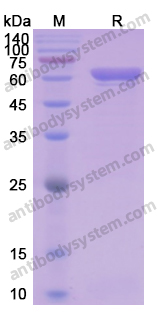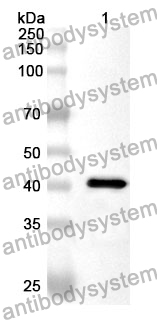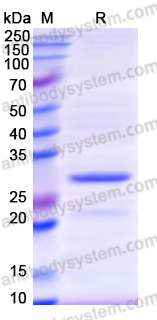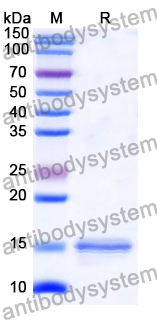Catalog No.
YHC83701
Expression system
E. coli
Species
Homo sapiens (Human)
Protein length
Ala27-Phe573
Predicted molecular weight
60.27 kDa
Nature
Recombinant
Endotoxin level
Please contact with the lab for this information.
Purity
>90% as determined by SDS-PAGE.
Accession
P10809
Applications
ELISA, Immunogen, SDS-PAGE, WB, Bioactivity testing in progress
Form
Lyophilized
Storage buffer
Lyophilized from a solution in PBS pH 7.4, 0.02% NLS, 1mM EDTA, 4% Trehalose, 1% Mannitol.
Reconstitution
Reconstitute in sterile water for a stock solution. A copy of datasheet will be provided with the products, please refer to it for details.
Shipping
In general, proteins are provided as lyophilized powder/frozen liquid. They are shipped out with dry ice/blue ice unless customers require otherwise.
Stability and Storage
Use a manual defrost freezer and avoid repeated freeze thaw cycles. Store at 2 to 8°C for frequent use. Store at -20 to -80°C for twelve months from the date of receipt.
Alternative Names
60 kDa heat shock protein, mitochondrial, HSP-60, HuCHA60, Chaperonin 60, HSP60, Mitochondrial matrix protein P1, Hsp60, HSPD1, 60 kDa chaperonin, CPN60, P60 lymphocyte protein, Heat shock protein 60
HSF1 remodels mitochondrial biogenesis and function in cancer cells via TIMM17A., PMID:40463013
Astrocytic HSP60 Deletion Induced Astrocyte Senescence and Inhibited Neuroregeneration via Modulating the S1P/Truncated-BDNF Pathway., PMID:40448367
Heat shock protein D1 is up-regulated in various types of canine mammary tumors., PMID:40386101
Diminution of HSP75 disrupts intestinal epithelial barrier by inciting mPTP opening in ulcerative colitis., PMID:40294832
Depletion of HSP60 in Microglia Leads to Synaptic Dysfunction and Depression-Like Behaviors Through Enhanced Synaptic Pruning in Male Mice., PMID:40237297
Plasma Proteomics of the Fontan Circulation Reveal Signatures of Oxidative Stress and Cell Death., PMID:40235440
Pathogenic mutation impairs functional dynamics of Hsp60 in mono- and oligomeric states., PMID:40180932
Heat shock protein family D member 1 mediates lung cancer cell‑induced angiogenesis of endothelial cells., PMID:40093510
Integrative analysis of serum proteomics and transcriptomics in hepatitis C., PMID:40082995
Comprehensive Analysis of the Role of Heat Shock Proteins in the Immune Microenvironment and Clinical Significance of Hepatocellular Carcinoma., PMID:39991516
HSPD1-facilitated formation of CTPS cytoophidia promotes proliferation in C2C12 cells., PMID:39971178
Dihydrotanshinone I potentiates the anti-tumor activity of cisplatin by activating ROS-mediated ER stress through targeting HSPD1 in lung cancer cells., PMID:39952584
Increased intracellular stress responses and decreased KLF2 in adult patients with atopic dermatitis., PMID:39938773
Construction and Validation of a Novel Butyrylation-Related Gene Signature Related to Prognosis, Clinical Implications, and Immune Microenvironment Characterization of Hepatocellular Carcinoma., PMID:39926543
Effects of in vitro cytochalasin D and hypoxia on mitochondrial energetics and biogenesis, cell signal status and actin/tubulin/Hsp/MMP entity in air-breathing fish heart., PMID:39864717
HSP60 controls mitochondrial ATP generation for optimal virus-specific IL-21-producing CD4 and cytotoxic CD8 memory T cell responses., PMID:39709477
Mitochondrial unfolded protein response-dependent β-catenin signaling promotes neuroendocrine prostate cancer., PMID:39690273
HSP60 inhibits DF-1 apoptosis through its mitochondrial signal peptide., PMID:39637657
Multi-omics joint screening of biomarkers related to M2 macrophages in gastric cancer., PMID:39623254
Proteomic analysis illustrates the potential involvement of dysregulated ribosome-related pathways and disrupted metabolism during retinoic acid-induced cleft palate development., PMID:39614345
Proteomic Profiling of COVID-19 Patients Sera: Differential Expression with Varying Disease Stage and Potential Biomarkers., PMID:39594201
snRNA-seq of human ovaries reveals heat shock proteins are associated with obesity related cancer risk., PMID:39593105
Lung Single-Cell Transcriptomics Offers Insights into the Pulmonary Interstitial Toxicity Caused by Silica Nanoparticles., PMID:39568699
Proteomic identification of potential biomarkers for heat tolerance in Caracu beef cattle using high and low thermotolerant groups., PMID:39538142
The Spleen Modulates the Balance of Natural and Pathological Autoantibodies in a Mouse Model of Autoimmune Arthritis., PMID:39519235
The mechanism underlying B-cell developmental dysfunction in Kawasaki disease based on single-cell transcriptomic sequencing., PMID:39507528
Heterozygous de novo variants in HSPD1 cause hypomyelinating leukodystrophy through impaired HSP60 oligomerisation., PMID:39500555
Purification of functional recombinant human mitochondrial Hsp60., PMID:39488385
Transcriptomic and Proteomic Insights into Host Immune Responses in Pediatric Severe Malarial Anemia: Dysregulation in HSP60-70-TLR2/4 Signaling and Altered Glutamine Metabolism., PMID:39452740
HSPD1 Supports Osteosarcoma Progression through Stabilizing ATP5A1 and thus Activation of AKT/mTOR Signaling., PMID:39430254
Heat stress affects milk yield, milk quality, and gene expression profiles in mammary cells of Girolando cows., PMID:39343218
Tubeimoside-I, an inhibitor of HSPD1, enhances cytotoxicity of oxaliplatin by activating ER stress and MAPK signaling pathways in colorectal cancer., PMID:39208999
Oxysterol Induces Expression of 60 kDa Chaperone Protein on Cell Surface of Microglia., PMID:39201760
Liver Mitochondrial Morphology and Gene Expression as Markers of Liver Reserve: Prognostic Implications for Native Liver Survival in Biliary Atresia., PMID:39187420
Artificial targeting of autophagy components to mitochondria reveals both conventional and unconventional mitophagy pathways., PMID:39177530
HSP60 chaperone deficiency disrupts the mitochondrial matrix proteome and dysregulates cholesterol synthesis., PMID:39147275
Asymmetric apical domain states of mitochondrial Hsp60 coordinate substrate engagement and chaperonin assembly., PMID:38951622
Autoimmunity to stromal-derived autoantigens in rheumatoid ectopic germinal centers exacerbates arthritis and affects clinical response., PMID:38950333
Quantitative analysis of the lysine acetylome reveals the role of SIRT3-mediated HSP60 deacetylation in suppressing intracellular Mycobacterium tuberculosis survival., PMID:38916288
High-throughput transcriptome profiling indicates ribosomal RNAs to be associated with resistance to immunotherapy in non-small cell lung cancer (NSCLC)., PMID:38857914
Integrated analysis of muscle transcriptome, miRNA, and proteome of Chinese indigenous breed Ningxiang pig in three developmental stages., PMID:38808333
Pathogenic Autoimmunity in Atherosclerosis Evolves from HSP60-Reactive CD4 + T Cells., PMID:38767798
Knockdown of heat shock protein family D member 1 (HSPD1) in lung cancer cell altered secretome profile and cancer-associated fibroblast induction., PMID:38663552
Cardiac-specific deletion of heat shock protein 60 induces mitochondrial stress and disrupts heart development in mice., PMID:38588611
A novel mitochondrial unfolded protein response-related risk signature to predict prognosis, immunotherapy and sorafenib sensitivity in hepatocellular carcinoma., PMID:38493408
Cryo-EM structure and molecular dynamic simulations explain the enhanced stability and ATP activity of the pathological chaperonin mutant., PMID:38412855
Identification of HSPD1 as a novel invasive biomarker associated with mitophagy in pituitary adenomas., PMID:38290248
The Genetic Selection of HSPD1 and HSPE1 Reduce Inflammation of Liver and Spleen While Restraining the Growth and Development of Skeletal Muscle in Wuzhishan Pigs., PMID:38200905
Integrated Bioinformatic Analysis of Differentially Expressed Genes Associated with Wound Healing., PMID:38192258




